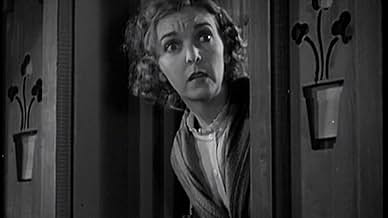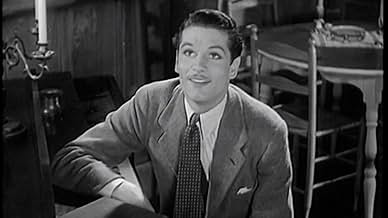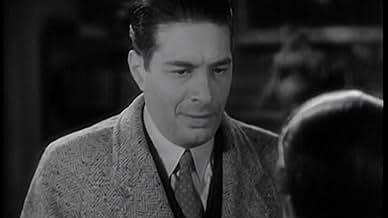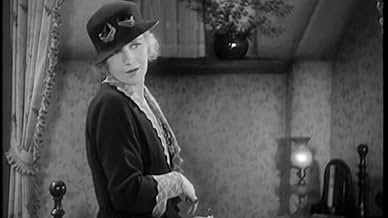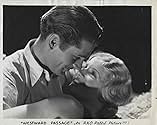Agrega una trama en tu idiomaA struggling writer divorces his wife to pursue his career without interference, but they meet in Europe years later after she has remarried.A struggling writer divorces his wife to pursue his career without interference, but they meet in Europe years later after she has remarried.A struggling writer divorces his wife to pursue his career without interference, but they meet in Europe years later after she has remarried.
- Dirección
- Guionistas
- Elenco
Lita Chevret
- Party Guest
- (sin créditos)
Joyce Compton
- Lillie
- (sin créditos)
Julie Haydon
- Bridesmaid
- (sin créditos)
Carl M. Leviness
- Ship Passenger
- (sin créditos)
- Dirección
- Guionistas
- Todo el elenco y el equipo
- Producción, taquilla y más en IMDbPro
Opiniones destacadas
Studios must have known the value of naming a film correctly, but in the case of Pathe, they called this one Westward Passage, which sounds like a bunch of people on a wagon train.
Actually it's a film about a modern (1932) young married couple, played by Ann Harding and Laurence Olivier.
I thought this might be a play for a couple of reasons. First is the amount of dialogue and secondly, it was third class Noel Coward and probably trying to cash in on Private Lives.
The story concerns a writer, Nicholas (Olivier) who marries Olivia (Ann Harding). It seems as if five minutes after the honeymoon, the two start quarreling on a hourly basis.
They live in a small apartment; Nicholas' publisher is demanding that he change the end of his novel, and he's refusing and loses his temper; and then she hits him up with the fact that she's pregnant, which he wasn't planning on.
Eventually, they divorce. Olivia marries Harry, who adores her and has money, though she's not in love with him. Hers and Nicholas' little girl (Bonita Granville) accompanies her.
A few years later, in Lucerne, Olivia happens by a bookstore selling Nicholas' book, and Nicholas, exiting, hands her a copy. He's now successful and decides he wants her back. He even takes passage (get it? westward passage) on a ship she's traveling on without her husband.
This isn't very good. Olivier, wearing odd eye makeup, hadn't learned acting before the cameras yet, so he's over the top. He wouldn't learn it until Wuthering Heights when, before the cast, he said, "I suppose this anemic little medium can't take great acting," which sent director William Wyler, the cast, and crew into spasms of laughter.
He's high energy, probably trying to cover up for the fact that his part isn't well written. A friend of mine used to take a line from Rebecca, "I hated her," and imitate Olivier, going into falsetto on "hated." Ever since then, I've noticed when Olivier gets excited, his voice goes up an octave at least in his youth.
Ann Harding is lovely. Unfortunately the film is beneath both of them. Olivier was destined to become one of the greatest actors in both theater and film, not to mention one of the most glorious looking. The elegant Harding eventually moved into character roles, working into the 1960s.
These actors are always worth seeing, provided you can make it through this somewhat boring movie.
Actually it's a film about a modern (1932) young married couple, played by Ann Harding and Laurence Olivier.
I thought this might be a play for a couple of reasons. First is the amount of dialogue and secondly, it was third class Noel Coward and probably trying to cash in on Private Lives.
The story concerns a writer, Nicholas (Olivier) who marries Olivia (Ann Harding). It seems as if five minutes after the honeymoon, the two start quarreling on a hourly basis.
They live in a small apartment; Nicholas' publisher is demanding that he change the end of his novel, and he's refusing and loses his temper; and then she hits him up with the fact that she's pregnant, which he wasn't planning on.
Eventually, they divorce. Olivia marries Harry, who adores her and has money, though she's not in love with him. Hers and Nicholas' little girl (Bonita Granville) accompanies her.
A few years later, in Lucerne, Olivia happens by a bookstore selling Nicholas' book, and Nicholas, exiting, hands her a copy. He's now successful and decides he wants her back. He even takes passage (get it? westward passage) on a ship she's traveling on without her husband.
This isn't very good. Olivier, wearing odd eye makeup, hadn't learned acting before the cameras yet, so he's over the top. He wouldn't learn it until Wuthering Heights when, before the cast, he said, "I suppose this anemic little medium can't take great acting," which sent director William Wyler, the cast, and crew into spasms of laughter.
He's high energy, probably trying to cover up for the fact that his part isn't well written. A friend of mine used to take a line from Rebecca, "I hated her," and imitate Olivier, going into falsetto on "hated." Ever since then, I've noticed when Olivier gets excited, his voice goes up an octave at least in his youth.
Ann Harding is lovely. Unfortunately the film is beneath both of them. Olivier was destined to become one of the greatest actors in both theater and film, not to mention one of the most glorious looking. The elegant Harding eventually moved into character roles, working into the 1960s.
These actors are always worth seeing, provided you can make it through this somewhat boring movie.
In the Citadel Film series book on the Films Of Laurence Olivier, Lord Olivier was not crazy about any of his movies before Wuthering Heights. But as to this film Westward Passage he was grateful to his co-star Ann Harding for being generous to a newcomer from across the pond. Maybe Ann wanted to make sure the blame went all around for this film.
Olivier came over the USA for the first time when RKO signed his then wife Jill Esmond and they found work for him as well. In this film he plays one massively egotistical struggling novelist whom you will positively hate as you see the film. He marries Ann Harding and they have a daughter who grows up in 10 years to be Bonita Granville.
Olivier embarks on a campaign to win his wife back who is now married to the earnest, but stodgy and rich Irving Pichel after Olivier literally threw her into his arms. This is after 10 years and Olivier is now a big success.
Quite frankly I found Olivier in this film to be one egotistical jerk and can't imagine why Harding isn't well glad to be rid of him. Of course I'd provide for visitation for Granville, but that's it.
Some good comedy relief is provided by Zasu Pitts playing an innkeeper. But this film is a romantic comedy that completely misfires.
Olivier came over the USA for the first time when RKO signed his then wife Jill Esmond and they found work for him as well. In this film he plays one massively egotistical struggling novelist whom you will positively hate as you see the film. He marries Ann Harding and they have a daughter who grows up in 10 years to be Bonita Granville.
Olivier embarks on a campaign to win his wife back who is now married to the earnest, but stodgy and rich Irving Pichel after Olivier literally threw her into his arms. This is after 10 years and Olivier is now a big success.
Quite frankly I found Olivier in this film to be one egotistical jerk and can't imagine why Harding isn't well glad to be rid of him. Of course I'd provide for visitation for Granville, but that's it.
Some good comedy relief is provided by Zasu Pitts playing an innkeeper. But this film is a romantic comedy that completely misfires.
I never, ever "got" Olivier. Even in his more famous roles I always thought he chewed the scenery to a ridiculous degree. And here, though he is handed a role that offers him no chance of redemption, he is as ham-handed as always.
Ann Harding, on the other hand, is as delightful as ever. Smart, sassy, intelligent, beautiful and thoughtful. I know she's pretty much forgotten these days, but she was a brilliant actress. From what I have seen, she never turned in a bad performance.
And Bonita Granville makes an audacious turn here as a child actress in her first role.
A film that is overly talky and lacking in plot, it is still worth enjoying....
Ann Harding, on the other hand, is as delightful as ever. Smart, sassy, intelligent, beautiful and thoughtful. I know she's pretty much forgotten these days, but she was a brilliant actress. From what I have seen, she never turned in a bad performance.
And Bonita Granville makes an audacious turn here as a child actress in her first role.
A film that is overly talky and lacking in plot, it is still worth enjoying....
The trouble with this film is the character played by Laurence Olivier. In the words of other characters in the movie, he is "selfish, self-centered, conceited and egotistical." I would add brash, argumentative and stubborn. In short, I hated his character, which ruined the film for me, even though without those qualities there would not have been a film. Apparently, 1932 audiences agreed with me; Olivier was persona non grata at RKO after this film lost $250,000 at the box office. Olivier went back to England and didn't make another film in America until Wuthering Heights (1939), when his talents were much more appreciated.
Besides being an early film of Olivier, this film is also noted for being the film debut of Bonita Granville, then ten years old. She gives a good performance, and you can see she is a natural born actress. The always lovely Ann Harding is also worth seeing, as well as Florence Lake and Edgar Kennedy, who have a nice bit of comic relief in one short scene aboard ship.
Besides being an early film of Olivier, this film is also noted for being the film debut of Bonita Granville, then ten years old. She gives a good performance, and you can see she is a natural born actress. The always lovely Ann Harding is also worth seeing, as well as Florence Lake and Edgar Kennedy, who have a nice bit of comic relief in one short scene aboard ship.
I liked this movie, in fact I like very much Ann Harding's "natural" acting style, her fresh appearance, her smile, she's a great (& forgotten) talent, and she needs to be rediscovered, as the excellent actress (& star) she was in the early thirties. Thanks to TCM, I've been able myself to "discover" her luminous presence on the silver screen, because few of her films are available on any format, on the market.
Here she plays nicely opposite a very young Laurence Olivier, and they have wonderful chemistry, as a struggling couple of newlyweds, trying to cope with their "incompatibilities", he's an aspiring writer and she tries hard to be the "devoted" wife.
Nice support from Irving Pichel as Harding's eternal suitor, Juliette Compton as Harding's sophisticated cousin,... check for Bonita Granville's first film role, as Harding & Olivier's daughter, who looks very, very pretty...she's already got plenty of talent & that "je ne sais quois" that made her a child star, later in the decade, as the brat in Goldwyn's 1936 "These Three".
A quality picture.
Here she plays nicely opposite a very young Laurence Olivier, and they have wonderful chemistry, as a struggling couple of newlyweds, trying to cope with their "incompatibilities", he's an aspiring writer and she tries hard to be the "devoted" wife.
Nice support from Irving Pichel as Harding's eternal suitor, Juliette Compton as Harding's sophisticated cousin,... check for Bonita Granville's first film role, as Harding & Olivier's daughter, who looks very, very pretty...she's already got plenty of talent & that "je ne sais quois" that made her a child star, later in the decade, as the brat in Goldwyn's 1936 "These Three".
A quality picture.
¿Sabías que…?
- TriviaTheatrical movie debut of Bonita Granville (Little Olivia Allen (age 10)).
- ErroresNick's telegram congratulating Olivia and Harry on their marriage is dated May 10 1928. Later scenes are supposed to take place six years later, despite the film having been released in 1932.
- ConexionesReferenced in The Complete Citizen Kane (1991)
- Bandas sonorasThe Wedding March
(uncredited)
from "A Midsummer Night's Dream"
Music by Felix Mendelssohn
Played by Laurence Olivier on the piano
Selecciones populares
Inicia sesión para calificar y agrega a la lista de videos para obtener recomendaciones personalizadas
Detalles
- Fecha de lanzamiento
- País de origen
- Idiomas
- También se conoce como
- Sacrificio de amor
- Locaciones de filmación
- Productora
- Ver más créditos de la compañía en IMDbPro
- Tiempo de ejecución1 hora 13 minutos
- Color
- Relación de aspecto
- 1.37 : 1
Contribuir a esta página
Sugiere una edición o agrega el contenido que falta

Principales brechas de datos
By what name was Westward Passage (1932) officially released in India in English?
Responda
